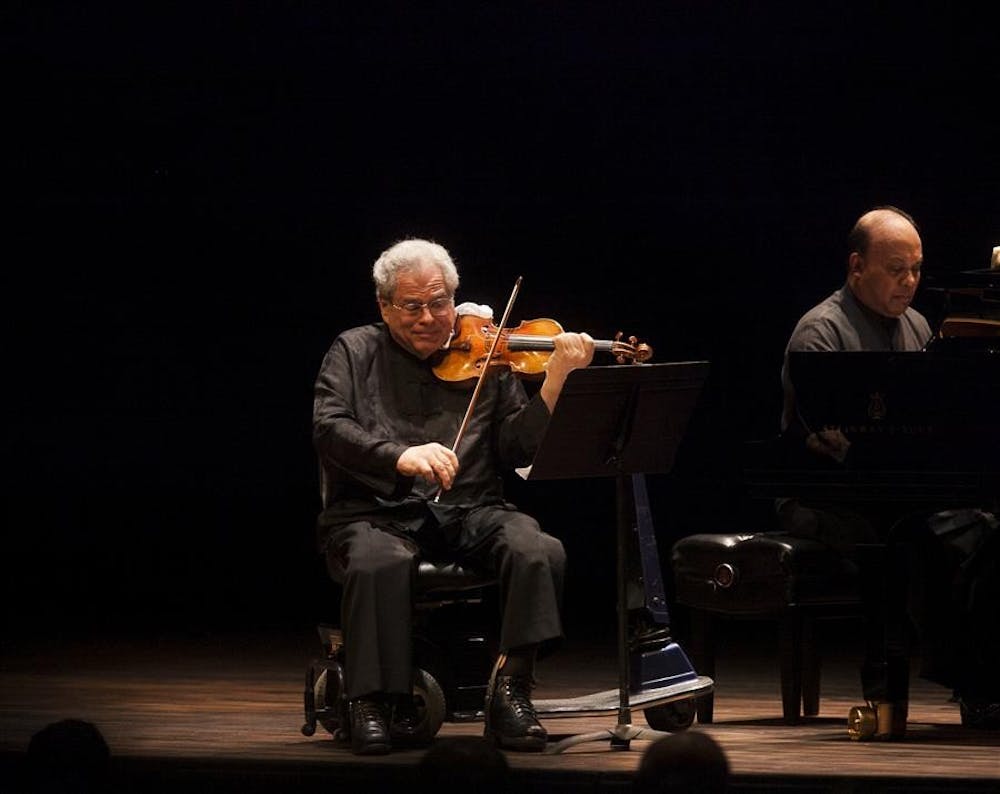Praised as a superstar, a champion of classical music, a beloved humanist, conductor, performer and artist, Itzhak Perlman holds an unprecedented musical influence. At 8 p.m. Thursday at the IU Auditorium, a packed audience welcomed him as the reigning virtuoso of the violin.
Like the great classical musicians of the nineteenth century, Franz Liszt and Niccolo Paganini, Perlman commands a celebrity rarely enjoyed by performers in the world of classical music.
Even those who don’t know Perlman’s art know his reputation. State Rep. Jim Lucas, R-69th District, came to the show after hearing of Perlman’s talent.
“We came just to hear the world’s best violinist play,” he said.
Perlman was born in Tel Aviv, Israel, in 1945.
At the age of three, after being denied entrance to the prestigious Ron Shulamit music conservatory for being too small to hold a violin, Perlman taught himself the instrument.
He gave his first concert at the age of ten, shortly before moving to the United States to study at the Juilliard School.
In 1958 Perlman performed the third movement from Felix Mendelssohn’s Concerto in E minor live on the Ed Sullivan show. He was thirteen years old.
“It sounded like a talented 13-year-old with a lot of promise,” Perlman said in a Huffington Post article. “But it did not sound like a finished product.”
Despite his early appearances on national television and his unique talent, he denied being a child prodigy.
“A child prodigy is somebody who can step up to the stage of Carnegie Hall and play with an orchestra one of the standard violin concerts with aplomb,” he said. “I couldn’t do that.”
Ironically, Perlman’s most famous collaborations have not been for the concert hall, but rather for the movie theater.
The film score for Steven Spielberg’s epic historical drama “Schindler’s List,” one of the most recognized film scores to date, was composed by John Williams and featured Perlman on the violin.
It won an Academy Award, a BAFTA and a Grammy, as well as a nomination for a Golden Globe, which Williams and Perlman won in 2005 with “Memoirs of a Geisha.”
Perlman’s performance Thursday night did not feature these works. Instead, it featured three sonatas by the nineteenth and twentieth century composers Ludwig van Beethoven, César Franck, and Claude Debussy.
These were performed with the pianist Rohan de Silva, winner of the prestigious Best Accompanist award for the 1990 Tchaikovsky Competition and a frequent collaborator with Perlman.
Ranging between blissful harmonies and tempestuous drama, the program featured a wide range of influences. Concertgoer Madeleine Steup said she was amazed.
Beethoven’s Sonata No. 8 in G Major, Op. 30 was composed between 1801 and 1802, the same years that he composed his second symphony.
The period was a traumatic time in the life of the composer. Beethoven had recently discovered his hearing loss and was contemplating suicide, a secret he disclosed in his famous Heiligenstadt letter, which he wrote just months after the sonata.
Franck’s Sonata for Violin and Piano in A major was the second piece performed by Perlman. It was written in four movements and composed as a wedding present for the famed Belgian violinist Eugene Ysaye.
“It’s very tempestuous,” IU sophomore Steup, a former violinist, said. “It has lots of different characters and it’s very balanced.”
Hailed as the father of musical Impressionism and the creator of a new, enriched tonality, Debussy moved away from this label as he began distancing himself from his pictorial, sensual music in favor of a more abstract sound.
His dozens of albums feature music from every major Classical epoch, as well as Jewish folk music, film scores, Spanish dances and jazz.
“He’s the best in the world,” said Lucas.
After the intermission, audiences returned for Perlman’s powerful finale, Debussy’s Sonata in G Minor for Violin and Piano.
The last work completed by the composer before his death at 55, the sonata showcases a new development in Debussy’s musical tendencies.
“It’s really incredible,” said Steup. “It’s mercurial, very romantic, very French.”
Violin virtuoso plays IU Auditorium

Get stories like this in your inbox
Subscribe



